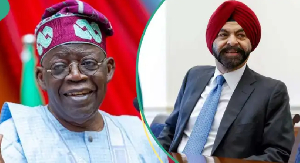The World Bank has urged the Federal Government to issue a presidential order increasing excise duties on certain goods to increase its non-oil revenue.
The financial institution is insisting on this as a key requirement for the government to access the rest of the $750 million loan.
This was contained in the World Bank’s latest Implementation Status and Results Report for the “Accelerating Resource Mobilisation Reforms Programme-for-Results”, effective from 14 October 2024, up to November 2028.
The reform programme is targeted at increasing Nigeria’s non-oil revenues and protecting revenues from the oil and gas sector.
Up until May 2025, Nigeria has only received 0.25% of the total approved loan amount, being $1.88 million.
In the report, the World Bank stated that the government has to issue a directive raising tax on selected goods, in order to unlock the disbursement of another $10 million.
World Bank wants Nigerian government to raise taxes
The World Bank wants the government to raise excise duties on a group of items referred to as “sin goods”.
They include:
-Alcoholic and non-alcoholic beverages
-Tobacco products
-Sugar and related products
A copy of the report obtained by The PUNCH from the bank’s website shows that six disbursement-linked results valued at $235 million have been achieved and are awaiting verification.
It added that the presidential order increasing taxes on these sin goods is the formal verification required to unlock the funds.
Nigerians to face higher taxes from tax reform bills
Former President Muhammadu Buhari introduced the excise duty in the Finance Act of 2020.
However, stakeholders argued that it would worsen inflation in a country where essential services are already too expensive, leading to its suspension.
The Nigeria Tax Bill 2024, finally passed by the Senate on 8 May 2025, has reintroduced a 5% excise duty on telecom services.
Coupled with the earlier approved increase in tariffs, Nigerians could be paying significantly more for calls and data by the end of 2025.
Sin goods like tobacco, alcoholic beverages, and non-alcoholic beverages also attract a 30% ad valorem tax plus a specific rate of ₦5.20 per stick for tobacco products.
Taxes on alcoholic beverages have also been increasing yearly, with wines and spirits currently attracting a 20% ad valorem tax. A duty of ₦10 per litre applies to non-alcoholic and sweetened beverages.
Overall, Nigerians will be paying significantly higher taxes across different items and sectors before the end of 2025.
More loan conditions from the World Bank
The DLR also lists other conditions that the Nigerian government is yet to meet. The World Bank report reads in part;
“The government has not yet adopted legislative orders to reform excises on pro-health goods and services (DLR 3.1). This may adversely impact revenue targets from pro-health taxes (DLR 3.2).”
The report also highlighted that the absence of these orders could impact Nigeria’s non-oil revenue targets and urged the government to accelerate them.
DLR 3.4 also linked the disbursement of $30 million to the implementation of green taxes, a policy Nigeria has yet to reach a consensus on. The green taxes recommend excise duties on heavy vehicles with engines larger than 2.0 litres and the possibility of a 10% carbon tax on petroleum products.
Even though Nigeria is yet to meet most of the requirements, some have been met, including increasing non-oil revenue from 5.5% of GDP in 2023 to 8.4% in 2024. Tax revenues from VAT, CIT, and Customs also increased from 3.8% of GDP in 2023 to 5.0% in 2024. These contribute to an overall rating of “Moderately Satisfactory” for the implementation progress, but the World Bank still held a “High” risk rating due to multiple concerns.
Stakeholders react to the World Bank’s requirement
Stakeholders seem to agree that while raising excise duties on sin goods may not be the problem, Nigeria has placed itself in a vulnerable position by always seeking loans.
Development economist and Chief Executive Officer of CSA Advisory, Dr Aliyu Ilias, described the condition to increase excise duties as pragmatic but noted that Nigeria is being overly influenced by external conditions.
He said:
“It is expected. Once we submit ourselves to the World Bank, they will continue to give us a lot of conditions. It’s not a bad thing if they ask us to increase excise duty. Even though we are just beginning to adopt it, it will be part of our GDP going forward. It is sad that they will continue to tell us what to do, sometimes to the detriment of our economy.”
Chief Economist at SPM Professionals, Dr Paul Alaje, had similar opinions on the matter and cautioned the federal government to consider the implications on the current fragile economic state before raising the excise duties.
He cautioned:
“The economy is not yet in a state of rest. So, it is important we are cautious, especially in applying several reforms simultaneously this year.”
Business News of Tuesday, 27 May 2025
Source: www.legit.ng













